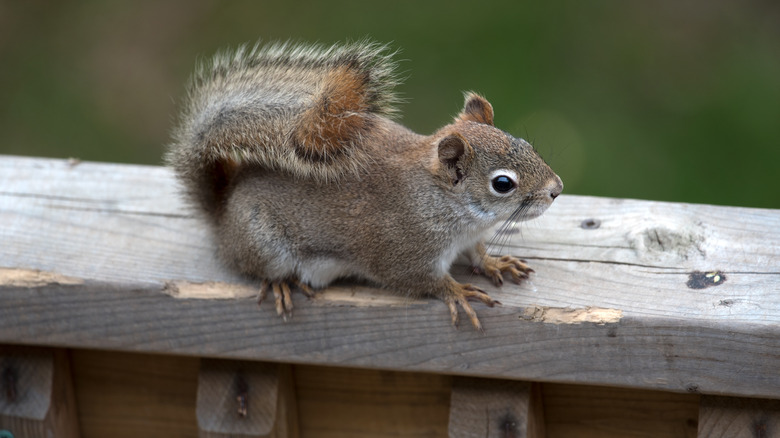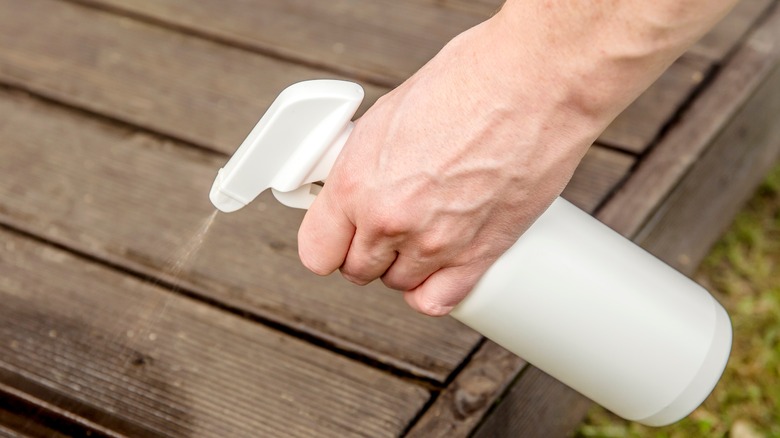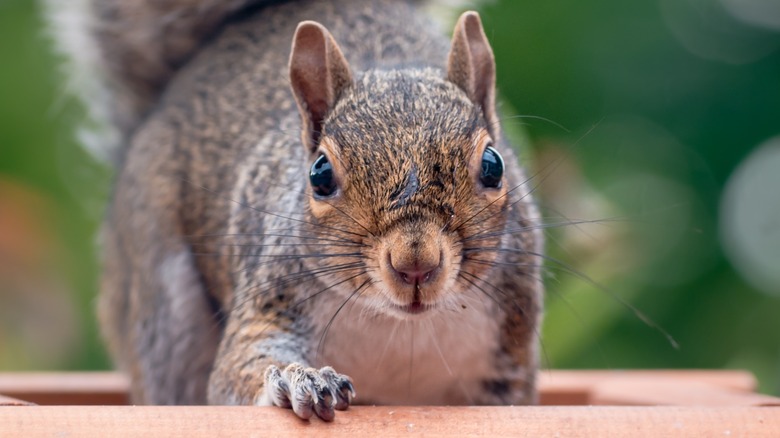DIY Squirrel Repellent To Save Your Deck & Outdoor Spaces From Destruction
It can seem impossible to stop squirrels from gnawing at your wood deck, but the easiest way to repel them may be just to make the experience unpleasant. Squirrels will chew wood for a few reasons, including to store food throughout the season, to wear down their endlessly-growing teeth, or to get materials for building a nest. These reasons often lead them to destroy outdoor spaces, especially wood decks and furniture. If they can bite into it or dig a hole, they will. Your goal, then, is to make that wood taste and smell less appealing with a spicy DIY spray.
A number of solutions can be paired with this, including using sounds and lights to distract and get rid of squirrels. However, a DIY repellent to try out that's fast and easy to make simply requires the use of a pepper-flavored spray. You can make it at home with a bit of hot sauce or spice mixture in a spray bottle. Then, apply it to the surfaces that the squirrels or other pests are destroying. You may have to do this a few times, but it's rather inexpensive and a quick process that offers good results for many people.
There are over-the-counter capsicum sprays you can buy, as well as other squirrel remedies available. However, before you spend a lot of money, try making your own DIY squirrel repellent. You may find it's easy to stop these critters from causing expensive and hard-to-repair destruction to your area.
DIY squirrel repellent to stop the gnawing
If you have a squirrel that's chewing on your outdoor furniture or the deck itself, the fastest and simplest way to resolve this is to make the surface taste bad. The spice of capsicum is a good starting point for treatment, though you'll need to be careful not to use anything that contains a high level of oil or coloring that could stain the surface it's sprayed on. Even then, be sure to test it on a hidden area to make sure it doesn't cause any damage. Look for an all-natural, ready-made product, or make your own instead. These are less likely to be dangerous to the health of animals. You want to repel squirrels, not harm them.
To make your own, use a clean and sanitized spray bottle. Add about 4 cups of warm water and 2 tablespoons of an organic hot sauce of your choice. Then, add in less than 1 teaspoon of mild dish soap. The soap works to help the liquid adhere to the surface of the wood, making it harder for the rain to wash it away. You can skip this step if you are concerned about the impact of animals ingesting the soap. Once you have all the ingredients included, shake the bottle to combine. Then, walk through the outdoor spaces and spray where you notice squirrel damage, such as small bite marks or damage to wood or other organic materials.
How to increase the success of your DIY squirrel repellent
The biggest drawback to the DIY spray is that you'll need to re-apply it until the pests are no longer in your area. This could take several weeks before they move on. During that time, amp up your efforts to make the space the least desirable area for them.
First, ensure you're minimizing any food sources like bird feeders close to the wood surfaces. Squirrels are rambunctious and more than willing to climb to get even a highly-perched feeder. You can also make your space less welcoming by making it seem unsafe to the squirrel. Because they have so many predators, squirrels are most likely to stick to areas where they feel safe. For example, to deter squirrels from your garden, place a spinning pinwheel in the area. The motion and lights bouncing off it will discourage them from coming into your space. You can also use wind chimes and other fixtures in your yard as a distraction, especially décor that flashes. Motion-activated devices can work as well.
Finally, keep at it. If you notice the capsicum spray isn't working, increase the amount of spice in it. Spray it not just on the areas they've already munched on but also on surrounding spaces, creating a more powerful flavor impact. Up the game by using a bar of perfume-heavy soap (all natural when possible) to make it even more unpleasant for them when they try to damage your wood.


